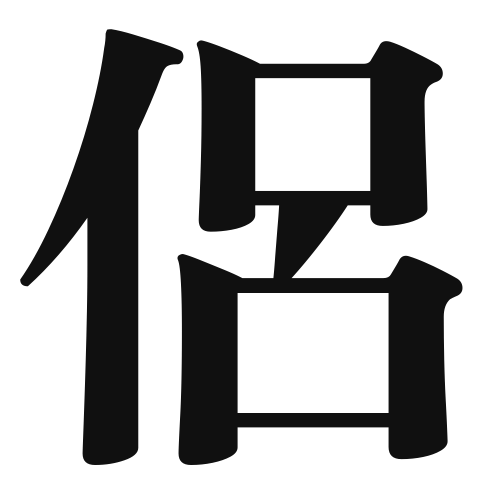1. Overview of Meaning
The kanji “侶” (pronounced “ryo” or “toru”) means “companion” or “partner.” It refers to someone who accompanies or assists another person, often in a close or supportive relationship.
2. Formation and Radical
Formation of the Kanji: The kanji “侶” is a compound character that combines elements to convey its meaning. It consists of the radical “亻” (which represents a person) and the character “呂,” which contributes to the overall meaning of companionship.
Radical: The radical of “侶” is “亻,” which is a variant of the radical “人” (meaning “person”). This radical is commonly found in kanji related to people or human actions.
3. Examples of Usage
Common Words and Phrases: Some frequently used words that include “侶” are “伴侶” (banryo – spouse or partner) and “友侶” (yūryo – friend or companion).
Example Sentences in Daily Conversation:
- 彼は私の良い侶です。 (Kare wa watashi no yoi ryo desu.) – He is a good companion for me.
- 私たちは長い間の侶です。 (Watashitachi wa nagai aida no ryo desu.) – We have been companions for a long time.
4. Synonyms and Antonyms
Similar Kanji: A similar kanji is “友” (yū), which means “friend.” While both “侶” and “友” refer to companionship, “侶” often implies a deeper or more formal relationship, such as a partner or spouse.
Opposite Kanji: An antonym for “侶” could be “孤独” (kodoku), which means “loneliness” or “solitude,” representing the absence of companionship.
5. Cultural and Historical Background
Relation to Japanese Culture: The concept of companionship is significant in Japanese culture, where relationships and social bonds are highly valued. The term “侶” often appears in literature and discussions about friendship and partnership.
Proverbs and Idioms: One relevant proverb is “友は金よりも貴し” (Tomo wa kane yori mo takashi), which translates to “A friend is more precious than gold,” emphasizing the importance of companionship over material wealth.
